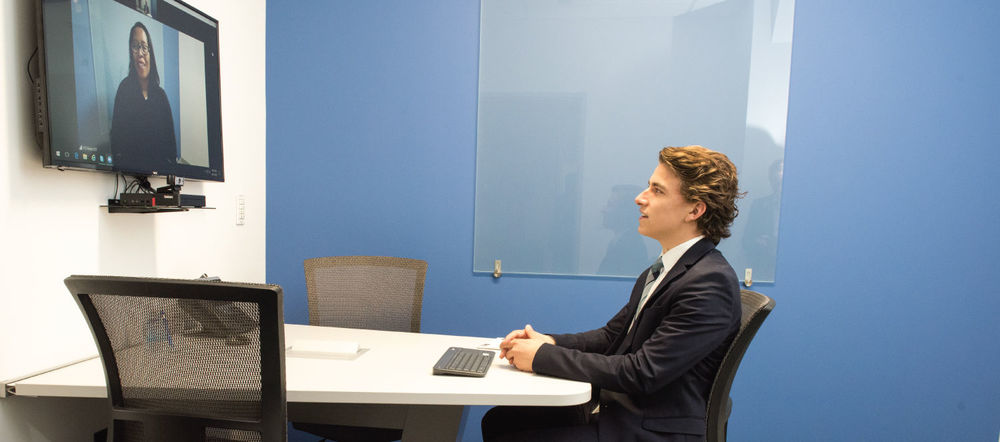Process

There's a method
Take the time to adequately prepare for your interview.
Interview Process
Interviews are used for both full-time and internship opportunities, as well as service, graduate/professional school, and fellowship opportunities. They are perhaps the most significant part of the hiring/evaluation process. Both you and the interviewer have your own objectives:
Personal Goals:
• Showcase skills and interpersonal qualities
• Demonstrate through specific examples and past experiences that you are a match for the position
• Determine if the position/organization are a good fit for you
Interviewer's Goals:
• If you have the skills to do the job
• If you are motivated to do the job
• If you are a fit with the organization’s culture
Formats:
Resume/Traditional
This form of interviewing goes through your resume. Questions are about your education, prior work experience, and activities. It is very straightforward. Be ready with examples.
Behavioral
Based on the principle that the best way to predict future behavior is from past behavior, this method of interviewing is one of the most commonly used. Behavioral questions typically begin with “Tell me about a time when…” or “Give me an example of when…” You should utilize the STAR technique to describe how your specific experiences relate to the job. Big Interview is a resource to help you practice your answers!
Case
Some companies, especially those in consulting and finance, are concerned not only with your experience but also with your ability to address complex problems and reach logical conclusions.The emphasis here is on your thought process; there is not necessarily a right or wrong answer.
Technical
Companies in financial services, accountancy, technology, engineering, or science may ask questions related to academic coursework or concepts (e.g. programming skills) and/or industry knowledge (e.g. market indices).
Modes
Phone
Prescreen: This may or may not be scheduled. If the employer calls unexpectedly, don’t be caught off guard - this call is still a critical part of the overall interview process. The employer will usually ask a few key questions to determine if you will continue in the interview process.
Scheduled: This is an in-depth prescreen before the site interview. However, for some internships a scheduled phone interview takes the place of a site interview and it may be the only interview. If this is the case, applicants are hired solely on the basis of the phone interview. Scheduled interviews can last anywhere from 15 minutes to an hour.
Tips for a Successful Phone Interview:
-
Have a professional voice message on your phone in case the employer reaches your voice mail
-
Ensure a good phone connection – charged battery; quiet location for the call; strong signal (Note: students can reserve a room at the Meruelo Family Center for Career Development Interview Center if space allows)
-
Before the interview, call yourself and leave a message answering the question “tell me about yourself” – check your intonation, volume, clarity, and how well you answered the question
Virtual
More employers are utilizing Zoom, or other virtual formats, especially if you are interviewing from abroad. Remember for a virtual interview to arrange for a quiet location and a non-distracting background behind you. If you are on campus and an employer wants to schedule a video conference the Meruelo Family Center for Career Development has rooms and equipment available. Please call (574) 631-5200 to schedule an interview room or a computer set up for a virtual interview.
On-site Visit
The on-site visit is usually the final stage of the interview process. A job offer for a full-time position is rarely made without a second interview, which is typically held on-site, but can also be on-campus. The purpose of this interview is for the employer and the student to become better acquainted with one another. Make sure that your cell phone is turned off the entire time you are with the employer—including events on the evening prior to the interview. Do not check the time on your phone – this could be misinterpreted. It is your host’s job to ensure you are kept on schedule and are where you need to be. Preparing for this interview, understanding travel arrangements and the schedule, and knowing what to expect are key to your success.
During a Meal
This isn’t about eating! You are being interviewed and assessed. Follow professional etiquette guidelines; select a meal that’s easy to eat neatly; stay attentive to questions, but aim for relaxed responses and conversation. If you are dining with more than one person, address and connect with everyone at the table. Meet with a Career Counselor if you have additional questions.
Testing
Some employers give candidates different types of tests as part of their hiring process. Testing can provide extra information about applicants that cannot be obtained from their resumes or interviews - aptitude, interests, learning styles, and other relevant characteristics.
Panel
Although the one-on-one interview is most common, a panel interview will often be conducted at the on-site visit. A group of individuals, perhaps representing different departments or functions with which the position interacts, ask a variety of questions to assess if the candidate can support the key interests of the department or function.
Group Project
Some employers will bring candidates for the same type of position together for a group project or simulation. The group is usually asked to dialogue, design, or recommend a solution to a challenge or daily project of the organization or industry. Your team player and group dynamic skills are being assessed, as well as the ideas and innovative thought you bring to the discussion or project.